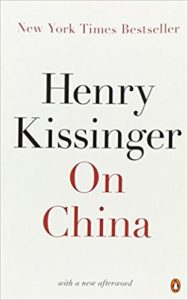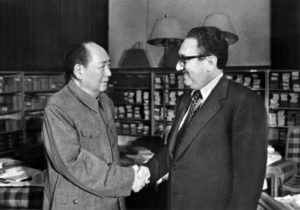
“On China” is a curious mixture of history, geopolitical analysis and self-serving memoir (concentrating mostly on the last two elements). Kissinger reviews some of the highlights of Chinese history; ancient and medieval China is covered quickly and superficially and the material is pretty much standard issue, but the level of detail increases after greatly from the opium war onwards and the book becomes much more interesting at that point. Kissinger makes the case that the Qing bureaucrats, in dire straits thanks to internal revolts, financial crisis and administrative decay, were not completely clueless or apathetic. Faced with determined, ruthless and far more technologically advanced European powers who had already overcome or overawed other great non-Western empires, Qing diplomats did their best to play European powers against one another and try to use (very limited) breathing space to try some fitful reforms, but the court was too far gone and the situation could not be salvaged, which led to 100 years of defeat, disorder, revolutions, famines and other disasters.
Kissinger, having worked with Zhou and Mao and their successors as partners in a world-altering initiative (US-Chinese rapprochement) keeps all criticisms of the CCP rather muted, while constantly highlighting their achievements and what he (enviously) regards as their diplomatic guile, patience and their special oriental “insight”. Given that any other posture would raise questions about how close Kissinger himself became to them and how much he tried to help them, this is not surprising, but it does make his assessments a bit suspect.
Anyhow, the second half of the book is really an account of “China and I”, with Henry popping in to save Mao from the Soviets (a threat that he, and the CCP as a whole) took very, very seriously), help Deng along as he starts China’s transition to capitalism and economic success and smooth over things when something mildly unpleasant like Tienanmen happens. In all, he made more than 50 trips to China, mostly as private citizen and/or unofficial emissary. This is certainly the most interesting part of the book and is full of insider quotes and anecdotes, including one where the Chairman is generously giving Taiwan a 100 years to come back to the motherland and a fawning Kissinger is telling him “it won’t take that long”. The complete amorality of the calculations of the PRC and Henry Kissinger is most obvious in the support both provided to the Khmer Rouge as they carried out their genocide in Kampuchea; Henry spends many pages explaining why this (and the Chinese “chastisement” of Vietnam in a limited punitive invasion) was necessary to prevent Vietnamese domination of South East Asia. Why that would be a core Chinese aims is easy to understand, but why the US should partner with them in this effort is not obvious, though Henry tries to present it as such. After the war, Deng tells K “if we had driven deeper into Vietnam in our punitive action, it would have been even better”. Kissinger: “it could be”!

The book is worth reading for the anecdotes and historical information. The geopolitical explanations are enlightening in that they show how these minds operate, but whether they operate for our benefit or not is an open question.
Slightly off topic, Mr. Ali. I’m new to your writing; it’s all really interesting! Out of curiosity though: I can’t seem to find anywhere that you have outlined your personal/intellectual views on Islam the religion, or religion in general for that matter. I see a lot of stuff from the other bloggers here, but relatively little on the topic from you. Apologies if this has already been asked or answered elsewhere! Just seemed like a natural question to ask considering the focus of the blog.